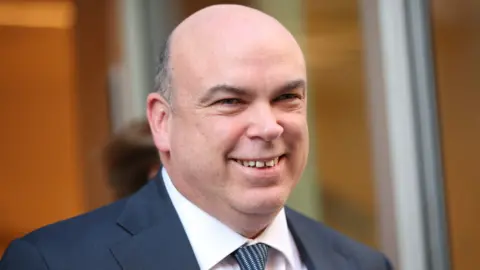Mike Lynch: Autonomy founder extradited to US in criminal case
 PA Media
PA MediaBritish tech entrepreneur Mike Lynch has been extradited to the US to face criminal charges over the $11bn sale of his firm Autonomy to Hewlett-Packard.
Mr Lynch - once dubbed "Britain's Bill Gates" after the Microsoft co-founder - will stand trial on charges including fraud, which he denies.
He is accused of overinflating the value of his software firm when he sold it to HP in 2011.
The Home Office confirmed that Mr Lynch was extradited to the US on Thursday.
The 57-year-old businessman, who is a founding investor in the UK cyber-security firm Darktrace, has long fought attempts by US prosecutors to stand trial in America.
According to US court documents, Mr Lynch has been ordered to pay bail of $100m with authorities claiming he is a "serious risk of flight" following his years of fighting extradition.
He will be confined to an address in San Francisco, guarded by private security which he must pay for himself.
Mr Lynch's net worth is estimated to be between £988m and £1.1bn.
A court filing said: "After lengthy extradition proceedings in the United Kingdom, Defendant Michael Richard Lynch has finally landed on our shores to stand trial, accompanied by the United States Marshals Service."
Last month, Mr Lynch lost an appeal in the High Court arguing that he should instead be tried in the UK.
The Home Office said: "On 21 April, the High Court refused Dr Lynch's permission to appeal his extradition. As a result, the normal 28-day statutory deadline for surrender to the US applies."
As a result, he was sent to California on Thursday where the trial will take place.
At the time of the sale in 2011, Autonomy was the UK's biggest software company and it was the largest-ever takeover of a British technology business.
HP was primarily known as a technology hardware company and buying Autonomy was aimed at diversifying its business.
However, just a year later, HP wrote down the value of Autonomy by $8.8bn and claimed it had been duped into overpaying for the company.
HP, Mr Lynch and Autonomy's former chief financial officer Sushovan Hussain have been mired in litigation ever since.
Hussain was jailed for five years and fined millions of dollars in 2019 on 16 counts of fraud, securities fraud and other charges.

What is Autonomy?
The company was founded in 1996 by Mr Lynch out of a specialist software research group called Cambridge Neurodynamics.
Autonomy developed software that could extract useful information from "unstructured" sources such as phone-calls, emails or video.
The software could then do things such as suggest answers to a call-centre operator or monitor TV channels for words or subjects.
It gained a listing on the US Nasdaq exchange in May 2000 at the height of the technology boom and was listed in London six months later.
The company suffered when the technology bubble burst, dropping out of the FTSE 100 and having to issue a profit warning in 2001.
But it grew rapidly and opened joint head offices in Cambridge and San Francisco, with other offices worldwide, to serve 65,000 customer companies.
Autonomy was sold to Hewlett-Packard for $11.1bn in 2011. Mr Lynch left the company in 2012.

Last year, HP won a civil fraud case against Mr Lynch and Hussain. The "unusually complex" trial lasted 93 days and involved millions of documents.
At the heart of the case, according to Mr Justice Hildyard, was HP's claim that "they were fundamentally misled and are victims of fraud".
Mr Lynch and Hussain's defence was that HP's claim was "'manufactured' to cover and justify a change of corporate mind, and to cast them as scapegoats for what in reality is buyer's remorse coupled with management failings".
In the end, Mr Justice Hildyard found the "claimants have substantially succeeded in their claims in this proceeding".
The BBC has contacted Mr Lynch's investment firm Invoke Capital for comment.
